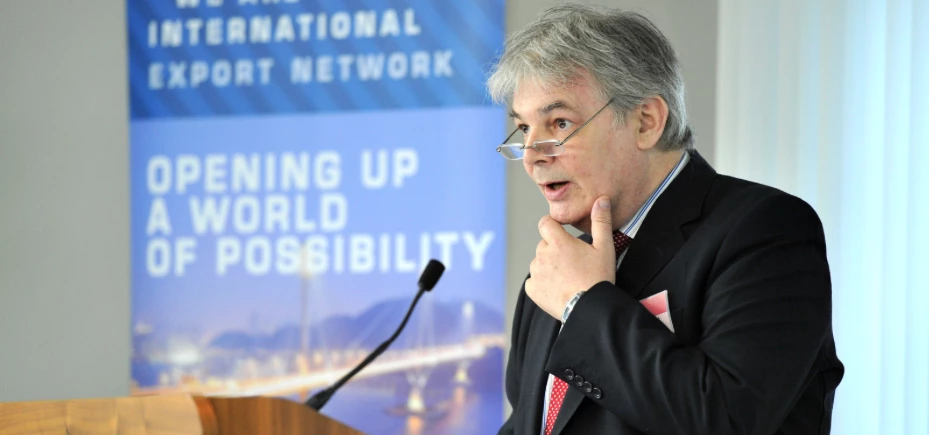
Partner Article
What I wish I’d known on starting exporting
Experienced international business people outlined what they wish they’d known when they started exporting at the eighth We are International Export Network event held in Leeds last month.
An audience of novice exporters heard the speakers: a manufacturer, an architect, an independent export adviser and a logistics expert describe the difficulties they had overcome as exporters at the two-hour event at international law firm, Addleshaw Goddard, on June 25.
Managing director of Industrial Textiles & Plastics Ltd, Easingwold, Marc Van Der Vort, whose business makes protective engineered textiles and chemical resistant membranes, discussed his experiences internationally, including in The Middle East and Europe.
As well as outlining the importance of researching behavior such as customs on how to greet and where gifts are appropriate, he stressed how crucial it is for UK exporters to ensure that they meet the right people.
He said: “In China we once made the error of meeting a sales director rather than the company principal. He kept passing notes on our talks into another room but never came back with an answer because he did not want to say no to us in front of his colleagues. Eventually we went somewhere else, met the decision maker and did the deal in an hour.”
Director of international projects at DWA Architects, Mel Fairbourn-Varley, who is experienced in the design of care facilities in the Far East and is involved in a major scheme in Guangzhou, China, also stressed the importance of understanding local culture.
He said: “We beat competition from Denmark and Hong Kong but, under Feng Shui, our design brief had the development the wrong way round. We had designed it as in Europe maximise daylight by facing East-West but under Feng Shui it had to be North-South.” They got the chance to change the design and retained the contract.
Export adviser, Paul Walters, managing director of Halifax-based Lime Tree Europe Ltd, said that, when planning overseas trips it was crucial to consider basic elements which could easily be overlooked with disastrous consequences.
He said: “Consider the logistics of getting yourself to overseas sales trips and to meetings and make your own arrangements. Think about who you are meeting and what they expect from you and do enough research to write down addresses in the local language and show them to taxi drivers as very often there are no street names and they will not understand your accent.”
Paul Walters also cautioned delegates to be aware of cultural difficulties. In The Far East the business relationships are the opposite to the west with personal relationships being developed before business ones. He added: “You do not have to learn an entire language. Phrases such as ‘hello’, ‘how are you’ and ‘please’ and ‘thank you’ are a real help in making the right impression.”
Logistics manager at global set top box manufacturer Pace Plc, Saltaire, Brian Farrell, said: “Since the creation of the EU Single Market in 1993, exporting has become more straight forward but there are still many different documents to be aware of such as Incoterms and Letters of Credit which, though useful, can be a minefield.”
Brian Farrell also explained how it was important to know that commodity codes can be legally challenged. He said: “A change in the commodity code for Pace Plc’s products was issued by the European Commission which added 14 per cent duty to our products and put us at a financial and competitive disadvantage when importing within the EU.
He said: “We appealed and eventually won the case at the European Court of Justice. This lead to €300,000 refund of the duty we had paid. The point of this is know your product, apply correct HS (Harmonized System Code & Harmonized Tariff Schedule) code and don’t be afraid of challenging for it if you have to.”
This was posted in Bdaily's Members' News section by Mike Clarke .
Enjoy the read? Get Bdaily delivered.
Sign up to receive our popular Yorkshire & The Humber morning email for free.








 Raising the bar to boost North East growth
Raising the bar to boost North East growth
 Navigating the messy middle of business growth
Navigating the messy middle of business growth
 We must make it easier to hire young people
We must make it easier to hire young people
 Why community-based care is key to NHS' future
Why community-based care is key to NHS' future
 Culture, confidence and creativity in the North East
Culture, confidence and creativity in the North East
 Putting in the groundwork to boost skills
Putting in the groundwork to boost skills
 £100,000 milestone drives forward STEM work
£100,000 milestone drives forward STEM work
 Restoring confidence for the economic road ahead
Restoring confidence for the economic road ahead
 Ready to scale? Buy-and-build offers opportunity
Ready to scale? Buy-and-build offers opportunity
 When will our regional economy grow?
When will our regional economy grow?
 Creating a thriving North East construction sector
Creating a thriving North East construction sector
 Why investors are still backing the North East
Why investors are still backing the North East